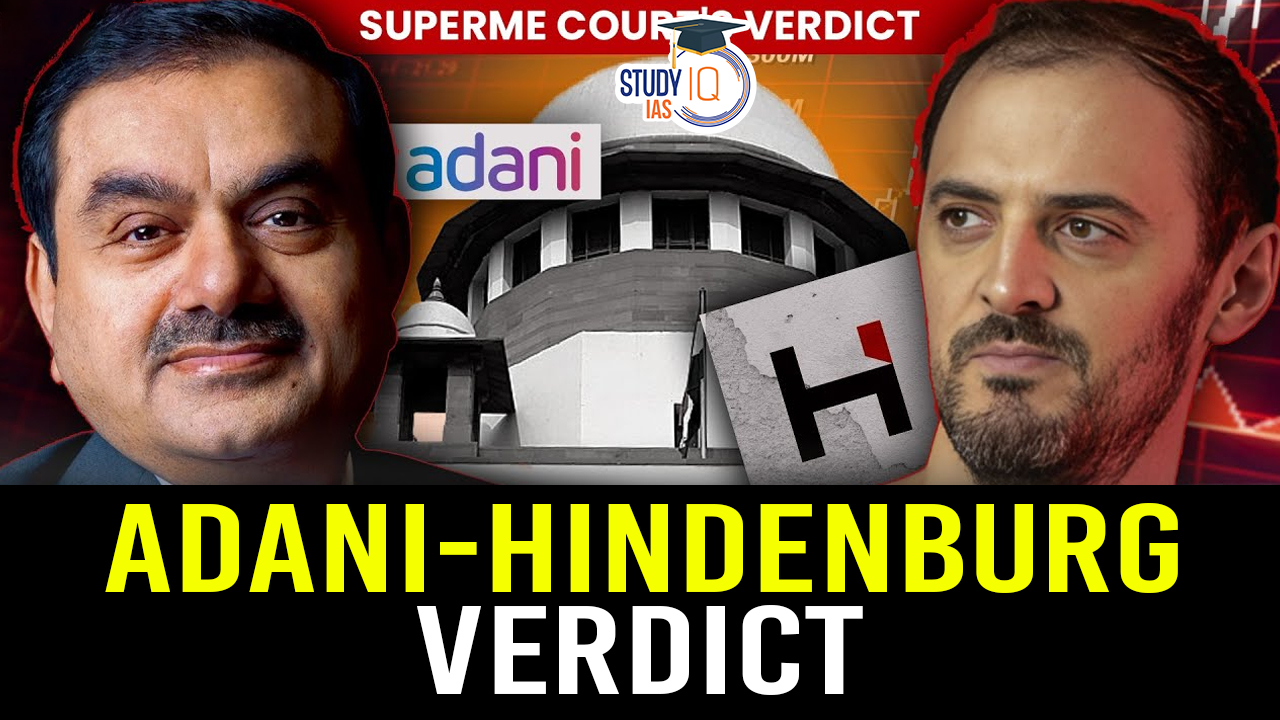Table of Contents
Context: The Supreme Court declined the initiation of a fresh investigation into the Adani Group, despite existing accusations related to stock manipulation and various infringements.
Background of Adani-Hindenburg Case
The Adani-Hindenburg case involves allegations made by Hindenburg Research against the Adani Group in January 2023. Hindenburg Research is a US-based short seller. The allegations include accounting fraud, stock price manipulation, and improper use of tax havens. The report also claimed that the Adani Group is “pulling the largest con in corporate history”.
- The report caused a stock market rout for the Adani Group, erasing close to $150 billion in market value at its lowest point.
- The rout also forced the cancellation of a ₹20,000 crore share sale. The Securities and Exchange Board of India (SEBI) became involved in the case.
What was the Adani-Hindenburg Case?
The Adani-Hindenburg issue revolves around allegations made by Hindenburg Research, a US-based institute specializing in forensic financial research. Founded in 2017 by Nate Anderson, the institute focuses on uncovering corruption, fraud, and irregularities in the business world.
Hindenburg Research and Short-Selling
Hindenburg Research is known for its expertise in activist short-selling. Short selling, as defined by the Securities and Exchange Board of India (SEBI), involves selling borrowed shares with the expectation of repurchasing them at a lower price. It is a strategy that contrasts with traditional stock market investments, where investors buy shares anticipating a rise in their value.
Hindenburg’s Allegations Against the Adani Group
Hindenburg Research alleges that the Adani Group, a conglomerate with interests spanning various sectors, including ports, logistics, power generation, agribusiness, and more, has been involved in extensive stock manipulation and accounting fraud schemes, totaling ₹17.8 trillion (US$ 218 billion) over several decades.
Key Points of Hindenburg’s Allegations
- Adani’s family allegedly controlled offshore shell entities in tax havens such as the Caribbean, Mauritius, and the United Arab Emirates.
- Research firm, Hindenburg, asserts that these entities were involved in corruption, money laundering, and taxpayer theft.
- The offshore entities are accused of diverting funds from publicly listed companies within the Adani group.
- Allegations suggest that the offshore structures were used for illicit financial activities, potentially impacting the integrity of the Adani family’s business operations.
Market Reaction and Concerns
The release of Hindenburg’s report led to a significant fall in the stock prices of Adani Group companies. This, in turn, raised concerns about the conglomerate’s ability to repay the substantial debt it has accumulated from Indian banks. The risk associated with lending large sums against shares is compounded by the potential drop in share prices if the company fails to meet its debt obligations.
Impact on Investors and LIC
Investors, including the Life Insurance Corporation of India (LIC), experienced sharp declines in their investments due to the report. The uncertainty surrounding the Adani Group’s financial stability has sparked fears among investors about potential losses.
Supreme Court’s Adani-Hindenburg Verdict
- Dismissal of Further Investigation: The Supreme Court declined requests for an additional probe to be conducted by either a Special Investigation Team or the Central Bureau of Investigation, opting to trust the current investigation by SEBI.
- Trust in SEBI’s Inquiry: The court saw no cause for scepticism regarding SEBI’s ongoing investigation and instructed it to complete the remaining segments within a three-month timeframe.
- No Need for Regulatory Revisions: The Supreme Court determined there was no necessity to compel SEBI to reverse recent modifications to the Foreign Portfolio Investors regulations and the Listing Obligations and Disclosure Requirement Regulations.
Adani-Hindenburg Case Timeline
Consequences of the Supreme Court’s Decision on Adani-Hindenburg Case
- Positive Market Reaction: The Supreme Court’s ruling led to a favourable reaction in the market, with Adani’s market capitalization increasing to ₹15 trillion, reflecting a resurgence in investor trust.
- Validation of SEBI’s Role: The judgement emphasises the significance of SEBI in the continuing investigation, underlining the critical role of regulatory authorities in upholding market fairness.
- Emphasis on Greater Transparency: The situation highlights the necessity for enhanced transparency and stronger regulation in financial markets, particularly in light of the issues regarding offshore entities and shareholding regulations.


 Places in News for UPSC 2025 for Prelims...
Places in News for UPSC 2025 for Prelims...
 New Phase of Operation Chakra to Combat ...
New Phase of Operation Chakra to Combat ...
 Soyuz Aircraft: History, Design and Sign...
Soyuz Aircraft: History, Design and Sign...





















